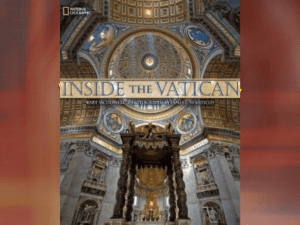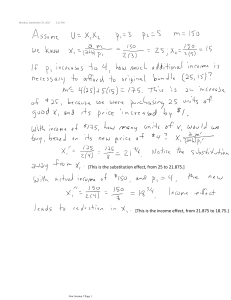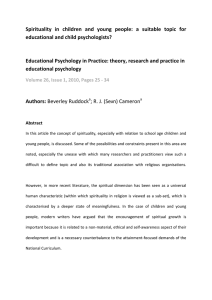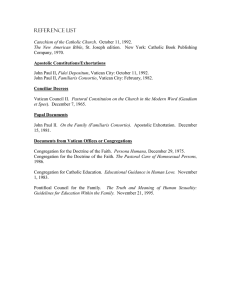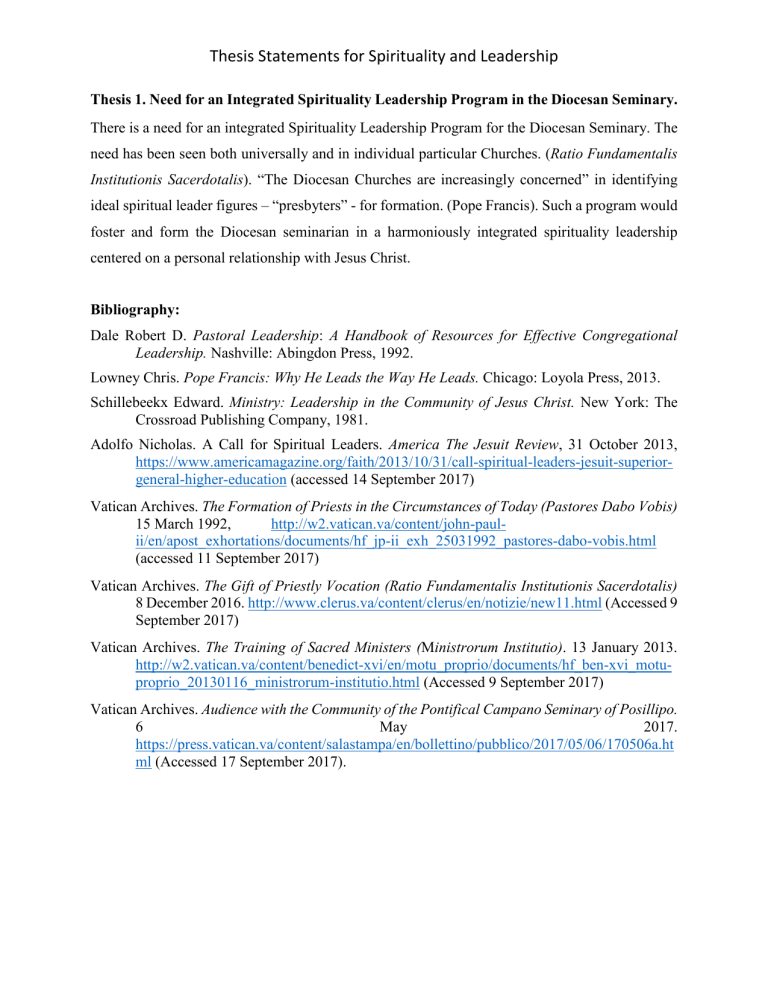
Thesis Statements for Spirituality and Leadership Thesis 1. Need for an Integrated Spirituality Leadership Program in the Diocesan Seminary. There is a need for an integrated Spirituality Leadership Program for the Diocesan Seminary. The need has been seen both universally and in individual particular Churches. (Ratio Fundamentalis Institutionis Sacerdotalis). “The Diocesan Churches are increasingly concerned” in identifying ideal spiritual leader figures – “presbyters” - for formation. (Pope Francis). Such a program would foster and form the Diocesan seminarian in a harmoniously integrated spirituality leadership centered on a personal relationship with Jesus Christ. Bibliography: Dale Robert D. Pastoral Leadership: A Handbook of Resources for Effective Congregational Leadership. Nashville: Abingdon Press, 1992. Lowney Chris. Pope Francis: Why He Leads the Way He Leads. Chicago: Loyola Press, 2013. Schillebeekx Edward. Ministry: Leadership in the Community of Jesus Christ. New York: The Crossroad Publishing Company, 1981. Adolfo Nicholas. A Call for Spiritual Leaders. America The Jesuit Review, 31 October 2013, https://www.americamagazine.org/faith/2013/10/31/call-spiritual-leaders-jesuit-superiorgeneral-higher-education (accessed 14 September 2017) Vatican Archives. The Formation of Priests in the Circumstances of Today (Pastores Dabo Vobis) 15 March 1992, http://w2.vatican.va/content/john-paulii/en/apost_exhortations/documents/hf_jp-ii_exh_25031992_pastores-dabo-vobis.html (accessed 11 September 2017) Vatican Archives. The Gift of Priestly Vocation (Ratio Fundamentalis Institutionis Sacerdotalis) 8 December 2016. http://www.clerus.va/content/clerus/en/notizie/new11.html (Accessed 9 September 2017) Vatican Archives. The Training of Sacred Ministers (Ministrorum Institutio). 13 January 2013. http://w2.vatican.va/content/benedict-xvi/en/motu_proprio/documents/hf_ben-xvi_motuproprio_20130116_ministrorum-institutio.html (Accessed 9 September 2017) Vatican Archives. Audience with the Community of the Pontifical Campano Seminary of Posillipo. 6 May 2017. https://press.vatican.va/content/salastampa/en/bollettino/pubblico/2017/05/06/170506a.ht ml (Accessed 17 September 2017). Thesis Statements for Spirituality and Leadership Thesis 2. Secular Leadership Approaches for Effective Pastoral Leadership The secular organizational leadership approaches can help in the formation of effective Pastoral Leadership (e.g. Seminarians, Priests, Catechists, PPC, PFC, Lay Ministry). These approaches are theories that can inform the practice of leadership and can be applied in different realistic situations. (Northouse). They also provide an inter-personal influencing process that is action/pastorally oriented with vision and initiative towards a holistic life. Suffice to say that pastoral leaders “do not occur in theory but act out of real values in concrete situations.” (Dale, 14). On the other hand, care must be taken that secularization of pastoral leadership does not occur. (Ratio 175). Rather than lean towards success and making and accumulating profit, the salvation of souls should be the primary focus at all times. (Canon 1752) Bibliography: Sowick Mathew and Eds. Leadership 2050: Critical Challenges, Key Contexts, and Emerging Trends, edited by Anthony C. Andenoro, Mindy McNutt, and Susan Ellaine Murphy. 1st ed. Bingley, UK: Emerald Group Publishing Limited, 2015. (Chapter 14). Dale Robert D. Pastoral Leadership. Nashville: Abingdon Press, 1992. Kellerman Barbara. Leadership: Multidisciplinary perspectives. New Jersey: Prentice-Hall, Inc, 1984. McCall Morgan Jr and Lombardo Michael. Leadership: Where else can we go? Durham: Duke University Press, 1978. Daloz Parks Laurent A. and eds. Common Fire: Leading Lives of Commitment in a Complex World, edited by Cheryl H. Keen, James P. Keen, Sharon Daloz Parks. Boston: Beacon Press, 1996. Northouse G. Peter. Leadership: Theory and Practice,7th ed. Los Angeles: SAGE Publications, 2016. Vatican Archives. The Gift of Priestly Vocation (Ratio Fundamentalis Institutionis Sacerdotalis) 8 December 2016. http://www.clerus.va/content/clerus/en/notizie/new11.html (Accessed 9 September 2017) Vatican Archives. Code of Canon Law, 1983. http://www.vatican.va/archive/ENG1104/_INDEX.HTM#fonte. (Accessed 11 September 2017). Thesis Statements for Spirituality and Leadership Thesis 3: Need to reflect on the guidelines on ongoing formation. There is a need to reflect on the guidelines on the ongoing formation of Clergy. So that they will be able to give appropriate answers to questions directed at them by people “of this age, it is also necessary for the clergy to know well the doctrines of the magisterium and the councils and the documents of the pontiffs and to consult the best of prudent writers of theological science.” (Presbyterorum Ordinis, 19). The guidelines for ongoing formation should not be seen as too rigid (Pope Francis), nor should it be seen in a simplistic view of ‘just updating’ but be seen as a necessity that directs an adaptive attitude to these changing times. Bibliography: Vatican Archives. The Gift of Priestly Vocation (Ratio Fundamentalis Institutionis Sacerdotalis) 8 December 2016. http://www.clerus.va/content/clerus/en/notizie/new11.html (Accessed 9 September 2017) Vatican Archives. Decree on the Ministry and Life of Priests (Presbyterorum Ordinis) 7 December 1965. http://www.vatican.va/archive/hist_councils/ii_vatican_council/documents/vatii_decree_19651207_presbyterorum-ordinis_en.html (Accessed 9 September 2017). Peter Northouse. Leadership Theory and Practice (Chapter 11), SAGE Publications Inc, Seventh Edition: Los Angeles, 2016. Ronald A. Heifetz. Leadership Without Answers. Belknap Press of Harvard University Press, Cambridge, 1998. Chris Lowney. Pope Francis: Why He Leads the Way He Leads. Loyola Press: Chicago, 2013. Vatican Archives. The Formation of Priests in the Circumstances of Today (Pastores Dabo Vobis) 15 March 1992, http://w2.vatican.va/content/john-paulii/en/apost_exhortations/documents/hf_jp-ii_exh_25031992_pastores-dabo-vobis.html (accessed 11 September 2017). Thesis Statements for Spirituality and Leadership Thesis 4: Discernment and Spiritual Direction are two tools in helping leaders make ethical decisions. An urgency exists in the Church today to form virtuous ethical leaders and to grow in the ability of spiritual discernment and direction. (Pope Francis). To help the Church grow and move forward confidently towards God and His will, ethical spiritual leaders, need to be solidly formed and grounded in the discernment processes and spiritual direction to help guide and direct the Church in this rapidly changing time. The turbulent atmosphere that surrounds the Church today can only be cleared and understood through good discernment and spiritual direction. Bibliography: Catechism of the Catholic Church nn.1803-1845 Pieper, Josef. The Four Cardinal Virtues: Prudence, Justice, Fortitude, Temperance. Notre Dame: University of Notre Dame Press, 1966. Karl H. Peschke. Christian Ethics: Moral Theology in the Light of Vatican II. Logos Publication Inc: Manila, 2012. Felipe Gomez. Virtue Ethics: Cardinal & Moral. East Asian Pastoral Institute: Manila Janet Ruffing. Spiritual Direction: Beyond the Beginnings. Paulist Press: Mahwah, 2000. Zenit Staff. Pope’s Conversation with Jesuits During His Trip to Poland. Zenit: The World Seen From Rome. 25 August 2016. https://zenit.org/articles/popes-conversation-with-jesuitsduring-his-trip-to-poland (Accessed 17th September 2017). Chris Lowney. Pope Francis: Why He Leads the Way He Leads. Loyola Press: Chicago, 2013. Gula Richard. Ethics in Pastoral Ministry. Mahwah: Paulist Press, 1996 (31-90). Thesis Statements for Spirituality and Leadership Thesis 5: The Dilemma amongst Diocesan priests about Diocesan Spirituality as opposed to Religious Spirituality e.g. Ignatian Spirituality. The traditional diocesan spirituality used to be associated with a variety of monastic religious spiritualities of the Jesuits, Dominicans, Franciscans, and the contemplative spiritualities of the Cistercians and Carmelites. (Cozzens). At a time when the priesthood is under scrutiny, a diocesan spirituality emerges, putting life and experience(Spirituality) as primary over knowledge and understanding (Theology). (Michael Amaladoss). It is a spirituality of communion, in the manner of the Trinitarian communion of which the Church and the world are in dire need. (Pope Francis) Vatican Archives. Address of His Holiness Pope Francis to participants in the International Assembly of the Apostolic Union of the Clergy. 16 November 2017. http://w2.vatican.va/content/francesco/en/speeches/2017/november/documents/pa pa-francesco_20171116_unioneapostolica-clero.html (Accessed 17th September 2017). Donald Cozzens. The Spirituality of the Diocesan Priest. Quezon: Claritian Publications, 2005. Klaus Kramer and Klaus Vellguth. Spirituality of the Universal Church: Rediscovering Faith. One World Theology, Vol 4. Quezon: Claritian Publications, 2014. Hernandez Will. Henri Nouwen and Spiritual Polarities: A life of Tension. Makati: Paulist Press,2013. Tickerhoof Bernard. Paradox: The Spiritual Path of Transformation. Pasay Philippines: Paulines Publishing House, 2002. Hernandez Will. Mere Spirituality: A Spiritual Life According to Henri Nouwen Thesis Statements for Spirituality and Leadership Thesis 6: The Fijian Traditional Culture Can Influence the Catholic Priesthood. The Fijian traditional cultural structure is similar to the Church’s hierarchical structure. The majority of the Catholic priests in Fiji “come from communities with strong community bonds and often find themselves given special honor because of their Ordination which gives them a privileged rank within society.” (John Paul II). Fijians perceive this arrangement with tremendous respect. Suffice to say that the Catholic priest can be blinded by such accolades, and fall into the trap of looking at his privileged rank not as a place of responsible service but as a position of power and control. Northouse G. Peter. Leadership: Theory and Practice.7th ed. Los Angeles: SAGE Publications, 2016. Chapter 16. Vatican Archives. Apostolic Exhortation of St Pope John Paul II on Jesus Christ and Peoples of Oceania: Walking His Way, Telling His Truth, Living His Life (Ecclesia de Oceania), 22 Nov 2001. http://w2.vatican.va/content/john-paulii/en/apost_exhortations/documents/hf_jp-ii_exh_20011122_ecclesia-inoceania.html (Accessed 17 Sep 2017). Nayacakalou, R. Rusiate. Leadership in Fiji. Melbourne: Oxford University Press, 1985. Deniau Alfred. The Catholic Church in Fiji 1844 – 1886. Suva: Bluebird Printery Ltd, 2013. Routledge David. Matanitu: The Struggle for Power in Early Fiji. Suva: Fiji Times Ltd, 1985. Mullins David. Bishop Patelesio Finau of Tonga: He Spoke the Truth in Love. Auckland: Catholic Publications Center, 1994. Garret John. To Live Among the Stars: Christian Origins in Oceania. Suva: Oceania Printers Ltd, 1985.


